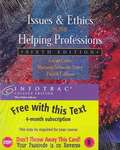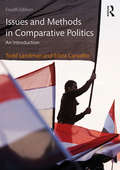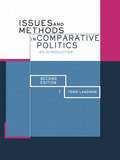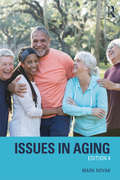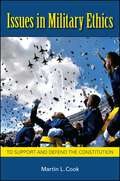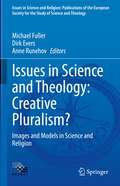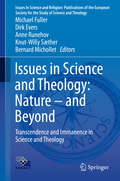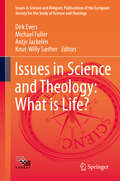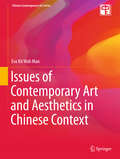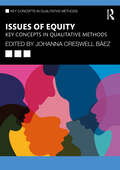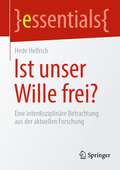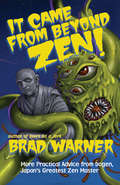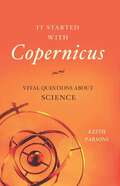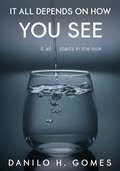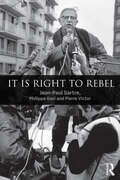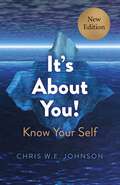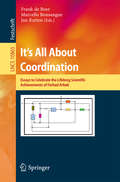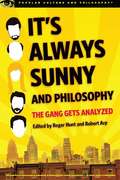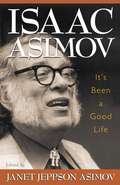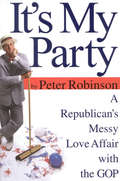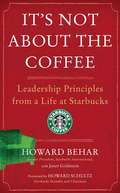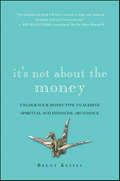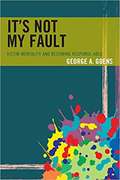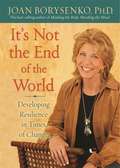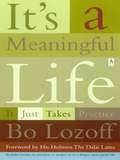- Table View
- List View
Issues and Ethics in the Helping Professions (with InfoTrac)
by Gerald Corey Marianne Schneider Corey Patrick CallananUp-to-date and challenging, this best-selling text is a practical manual that helps future and current professionals deal with ethical issues that they will confront at the various stages in their development. The authors provide readers with the basis for discovering their own guidelines within the broad limits of professional codes of ethics and divergent theoretical positions. They raise what they consider to be central issues, present a range of diverse views on these issues, discuss their position, and provide readers with many opportunities to refine their own thinking and to actively develop their own position. The authors explore such questions as: What role do the therapist's personal values play in the counseling relationship? What ethical responsibilities and rights do clients and therapists have? What considerations are involved in adapting counseling practice to diverse client populations?
Issues and Methods in Comparative Politics: An Introduction
by Todd Landman Edzia CarvalhoBuilding on the strengths of the third edition, this highly regarded textbook continues to provide the best introduction to the strategies of comparative research in political science. Divided into three parts, the book begins by examining different methods, applying these methods to dominant issues in comparative politics using a wealth of topical examples from around the world, and then discusses the new challenges in the area. This thoroughly revised and updated edition features: Additional contemporary case studies including the democratisation of technology and the Arab Spring; Detailed discussion of regression analysis and diffusion; More analysis of justice, inequality, and compliance; Reflection on new methods and treatments of contemporary comparative politics. Balancing reader friendly features with high quality analysis makes this popular academic text is essential reading for everyone interested in comparative politics and research methods.
Issues and Methods in Comparative Politics: An Introduction
by Todd LandmanBuilding on the strengths of the first edition, this accessible and user-friendly textbook explores the strategies of comparative research in political science. It begins by examining different methods, then highlights some of the big issues in comparative politics using a wealth of topical examples before discussing the new challenges in the area. Thoroughly revised throughout with the addition of extensive new material, this edition is also supplemented by the availability online of the author's datasets.The book is designed to make a complex subject easier and more accessible for students, and contains: * briefing boxes explaining key concepts and ideas* suggestions for further reading at the end of each chapter* a glossary of terms.
Issues in Aging: An Introduction To Gerontology (Mysearchlab Series 15% Off Ser.)
by Mark Novak<p>Issues in Aging combines social, psychological, biological, and philosophical perspectives to present a multifaceted picture of aging. Novak illustrates both the problems and the opportunities that accompany older age. This text helps students understand the tremendous variability in aging and introduces them to careers working with older adults. <p>This new edition reflects the continued changes in the way we age. The fourth edition has been updated to include emerging issues in aging. These include the prevalence of HIV/AIDs in later life, current research on mental potential in old age, the creation of age-friendly cities, and new options for end-of-life care. <p>Each chapter begins with a set of learning objectives to guide students in their reading, and concludes with a list of main points, questions for discussion or study, suggested readings, and relevant web sites to consult. Each chapter also includes up-to-date charts and graphs as well as key terms to help students understand the issues presented. Break out boxes reveal the human side of aging through the stories of individuals in real life and in the media.</p>
Issues in Military Ethics: To Support and Defend the Constitution
by Martin L. CookReflecting on a seventeen-year career teaching at military educational institutions of the Air Force, the Army, and the Navy, Martin L. Cook finds a powerful but underappreciated basis for military ethics in the oath to the Constitution that members of the armed services pledge. In Issues in Military Ethics, Cook considers the role of airpower in counterinsurgency war and the place of robotic weapons systems on the battlefield, but he also looks beyond ethics in the conduct of war to issues arising in military life generally. He addresses a range of other issues with pressing contemporary relevance, including civil-military relations, ethics education, and religion, in particular the ascendency of evangelical Christianity in military culture. This volume serves as an important resource for scholars, members of the armed services, and educators alike.
Issues in Science and Theology: Images and Models in Science and Religion (Issues in Science and Religion: Publications of the European Society for the Study of Science and Theology #6)
by Dirk Evers Michael Fuller Anne RunehovThis book brings together selected papers from scientists, theologians and philosophers who took part in the 2021 conference of the European Society for the Study of Science and Theology based in Madrid, Spain. The contributions constitute a cutting-edge resource for considering questions from interdisciplinary perspectives, covering both the crucial role played by images and models in our thinking and also the limitations which are inherent in these linguistic devices. Questions addressed include: Can this use of images and models generate a creative pluralism, enabling us to think outside the disciplinary silos which are a feature of academic discourse? Can they enable fruitful, synergistic, interdisciplinary conversations? This book will appeal to students and academics alike, particularly those working in the fields of philosophy, theology, ethics and the history of science.
Issues in Science and Theology: Transcendence and Immanence in Science and Theology (Issues in Science and Religion: Publications of the European Society for the Study of Science and Theology #5)
by Dirk Evers Michael Fuller Anne Runehov Knut-Willy Sæther Bernard MicholletThis book addresses a variety of important questions on nature, science, and spirituality: Is the natural world all that there is? Or is it possible to move ‘beyond nature’? What might it mean to transcend nature? What reflections of anything ‘beyond nature’ might be found in nature itself? Gathering papers originally delivered at the 2018 annual conference of the European Society for the Study of Science and Theology (ESSSAT), the book includes contributions of an international group of scientists, philosophers, theologians and historians, all discussing nature and what may lie beyond it. More than 20 chapters explore questions of science, nature, spirituality and more, includingNature – and Beyond? Immanence and Transcendence in Science and ReligionAwe and wonder in scientific practice: Implications for the relationship between science and religionThe Cosmos Considered as a Moral InstitutionThe transcendent within: how our own biology leads to spiritualityPreserving the heavens and the earth: Planetary sustainability from a Biblical and educational perspective Issues in Science and Theology: Nature – and Beyond will benefit a broad audience of students, scholars and faculty in such disciplines as philosophy, history of science, theology, and ethics.
Issues in Science and Theology: What is Life?
by Dirk Evers Michael Fuller Knut-Willy Sæther Antje JackelénThis book explores the concept of Life from a range of perspectives. Divided into three parts, it first examines the concept of Life from physics to biology. It then presents insights on the concept from the perspectives of philosophy, theology, and ethics. The book concludes with chapters on the hermeneutics of Life, and pays special attention to the Biosemiotics approach to the concept. The question 'What is Life?' has been deliberated by the greatest minds throughout human history. Life as we know it is not a substance or fundamental property, but a complex process. It is not an easy task to develop an unequivocal approach towards Life combining scientific, semiotic, philosophical, theological, and ethical perspectives. In its combination of these perspectives, and its wide-ranging scope, this book opens up levels and identifies issues which can serve as intersections for meaningful interdisciplinary discussions of Life in its different aspects. The book includes the four plenary lectures and selected, revised and extended papers from workshops of the 14th European Conference on Science and Theology (ECST XIV) held in Tartu, Estonia, April 2012.
Issues of Contemporary Art and Aesthetics in Chinese Context
by Eva Kit Wah ManThis book discusses how China's transformations in the last century have shaped its arts and its philosophical aesthetics. For instance, how have political, economic and cultural changes shaped its aesthetic developments? Further, how have its long-standing beliefs and traditions clashed with modernizing desires and forces, and how have these changes materialized in artistic manifestations? In addition to answering these questions, this book also brings Chinese philosophical concepts on aesthetics into dialogue with those of the West, making an important contribution to the fields of art, comparative aesthetics and philosophy.
Issues of Equity: Key Concepts in Qualitative Methods (Key Concepts in Qualitative Methods)
by Johanna Creswell BáezIssues of Equity: Key Concepts in Qualitative Methods provides practical and theoretical tools to advance equity in qualitative research, featuring chapters on research methods, concepts, and populations. The short chapters offer guidance for researchers, students, and practitioners to conduct ethically sound and transformative qualitative research focused on diverse perspectives and social justice principles.This book covers a wide range of topics essential to equity in qualitative research. Methods like testimonio research, person-centered interviewing, black liberation research, and liberatory participatory action research provide ways to amplify marginalized voices, promote collaboration, and create knowledge grounded in participants’ lived experiences. Key concepts such as transformative-emancipatory praxis, critical reflexivity, and counternarratives offer innovative frameworks for analyzing power dynamics in qualitative research. Chapters on research with culturally diverse populations, within the Lesbian, Gay, Bisexual, Transgender, Queer and Questioning, Intersex, Asexual, and Two-Spirit (LGBTQIA2S+) community, and through Diné (Navajo) Philosophy and Indigenous Ways of Knowing highlight the importance of uplifting cultural identities and ways of knowing... The book’s main findings emphasize the importance of integrating social justice principles in all phases of research, encouraging critical reflexivity, and understanding context-specific challenges to conducting equitable qualitative research studies.Aimed at qualitative researchers, students, and practitioners, the book provides practical and theoretical tools to center equity in research design, implementation, and analysis.
Ist unser Wille frei?: Eine interdisziplinäre Betrachtung aus der aktuellen Forschung (essentials)
by Hede HelfrichIm Alltag sind wir oft davon überzeugt, verschiedene Handlungsmöglichkeiten zu haben und uns „frei“ für eine der Möglichkeiten entscheiden zu können. Dagegen wird von Vertretern der Hirnforschung der freie Wille als Irrglaube deklariert. Unser Verhalten beruhe auf Gehirnfunktionen, die ihrerseits durch unsere genetische Ausstattung und unsere Umwelterfahrungen geprägt sind. In diesem essential wird argumentiert, dass ein freier Wille nicht gegen Naturgesetze verstößt und dass die Determiniertheit des menschlichen Handelns durch Anlage und Umwelt Spielräume für selbstbestimmtes Handeln lässt. Es wird gezeigt, dass es keinerlei empirischen Nachweis dafür gibt, dass der freie Wille nicht existiert.
It Came from Beyond Zen!: More Practical Advice from Dogen, Japan's Greatest Zen Master
by Brad WarnerVol. 2 of Brad Warner’s Radical but Reverent Paraphrasing of Dogen’s Treasury of the True Dharma EyeIn Japan in 1253, one of the great thinkers of his time died — and the world barely noticed. That man was the Zen monk Eihei Dogen. For centuries his main work, Shobogenzo, languished in obscurity, locked away in remote monasteries until scholars rediscovered it in the twentieth century. What took so long? In Brad Warner’s view, Dogen was too ahead of his time to find an appreciative audience. To bring Dogen’s work to a bigger readership, Warner began paraphrasing Shobogenzo, recasting it in simple, everyday language. The first part of this project resulted in Don’t Be a Jerk, and now Warner presents this second volume, It Came from Beyond Zen! Once again, Warner uses wry humor and incisive commentary to bridge the gap between past and present, making Dogen’s words clearer and more relevant than ever before.
It Started with Copernicus: Vital Questions about Science
by Keith ParsonsA unique approach to the philosophy of science that focuses on the liveliest and most important controversies surrounding science Is science more rational or objective than any other intellectual endeavor? Are scientific theories accurate depictions of reality or just useful devices for manipulating the environment? These core questions are the focus of this unique approach to the philosophy of science. Unlike standard textbooks, this book does not attempt a comprehensive review of the entire field, but makes a selection of the most vibrant debates and issues. The author tackles such stimulating questions as: Can science meet the challenges of skeptics? Should science address questions traditionally reserved for philosophy and religion? Further, does science leave room for human values, free will, and moral responsibility? Written in an accessible, jargon-free style, the text succinctly presents complex ideas in an easily understandable fashion. By using numerous examples taken from diverse areas such as evolutionary theory, paleontology, and astronomy, the author piques readers' curiosity in current scientific controversies. Concise bibliographic essays at the end of each chapter invite readers to sample ideas different from the ones offered in the text and to explore the range of opinions on each topic. Rigorous yet highly readable, this excellent invitation to the philosophy of science makes a convincing case that understanding the nature of science is essential for understanding life itself.
It all depends on how you see: It all starts in the look
by Ana Cristina Rodrigues Gomes Danilo Henrique GomesIn "It all depends on how you see", the author brings a different way of seeing the world and the problems of everyday life. Based on theology and phenomenology, a famous line of philosophical thought, the reader can reprogram his mind to enjoy life in an uncomplicated way. Find in this book related topics: - Phenomenology (line of thought of philosophy) - To the power of optimism and pessimism - Cognitivism (line of thought of psychology) - To the power of conviction - The subjectivity - The right way to see the world And much more! The old thoughts and theories of scientists such as William James, Edmund Husserl, Jean-Paul Sartre, and others are analysed in a well-explained and somehow funny way, and the way in which they are applied in everyday life is set forth in the pages of this work. Your gaze commands your way of living life and it can be modified, so immerse yourself in this book and change your way of seeing the world.
It is Right to Rebel
by Jean-Paul Sartre Philippe Gavi Pierre VictorThe early 1970s were a crucial period in the political and intellectual climate of France. The newspaper Libération was founded in the wake of the protest movements of 1968, and the country was gripped by industrial, political and civil unrest on a huge scale. Behind all this were deep debates about the nature and justification of revolt, class conflict and consciousness, and the nature of what it meant to be free.It is Right to Rebel, available in English for the first time with a new Preface by Philippe Gavi, is a fascinating discussion between three thinkers about this extraordinary period. The book comprises extensive conversations between the philosopher and writer Jean-Paul Sartre, journalist and co-founder of Libération Philippe Gavi, and political radical and Maoist Pierre Victor, all conducted between 1972 and 1974. In these conversations Sartre works out his relation between socialism and freedom, providing fascinating background to his tortured relationship with the French Communist Party. Together with his interlocutors they explore and debate what should be the basis of ethics, the nature of oppression and racism, including immigration, the Arab-Israeli conflict, the Chilean military coup in 1973 and more. A recurring theme is their exploration of two major questions: what should ethics be based on, and what makes for a revolutionary?It is Right to Rebel is a fascinating insight into the philosophical and political background to Sartre's thought as well as the two lesser-known figures of Gavi and Victor, who play political foil to Sartre's measured philosophical stance. It is a fascinating, rich new resource for anyone studying Sartre, political theory, and French politics and political history.
It's About You!: Know Your Self
by Chris W. JohnsonThe ultimate guide to understanding your magnificent multi-dimensional Self--so that you can begin living a fearless, fulfilling life of contentment.Why are you here in the physical world at this crucial and chaotic time for humanity? What if you were aware of your higher self's spiritual reasons for being here? What if you could fearlessly pursue those things that excite your passions without worrying about money or whether you are worthy of doing so? What does it take to fully express your Self?It's About You! Know Your Self is the first book in a trilogy that integrates profound insights from a wide variety of physical and nonphysical sources of knowledge into a set of experiential workbooks.The primary aim of the trilogy is to make the reader consciously aware of the subconscious "spiritual" impulses that steer one's experiences in life.Such awareness brings clarity on the purpose of our current lifetime and why our Essence (higher) self presents us with certain challenges along the way. Essentially (!) our Essence self has a few learning goals for this lifetime, all of which contribute to the overall expansion and evolution of our personal expression within Consciousness.Know Your Self, through its series of exercises, initiates a journey of gentle self-transformation that releases emotional and psychological obstructions on the way to consciously managing the key issues that affect our lives--self-worth, health, relationships, and our flow of abundance--enabling us to live a more fun-filled, altruistic way of life.In this newly edited, revised edition, you will discover the totality of your indivisible Self--from the fabulous resources of your Essence self, to the foibles, fears and wayward beliefs of your ego-self--and learn how to deal with your ego-self's challenges in a compassionate and forgiving manner.Know Your Self presents a new model of the Self, incorporating psychological aspects and "layers" to the Self offered in the Seth material and other channeled sources of wisdom. This new model allows the reader to understand better:the nature of your spiritual existence,how this provides the source energy for your physical existence,to feel more confident of your continued existence after physical death,and open a reconnection to the inner guidance of your Essence self.As the metaphysical character Seth reminds us:"The ego then, is only part of a much larger self, but because consciously you do not perceive the whole self you arbitrarily make [it] a unit from a truly indivisible identity, and call this the "I." You succeed in cutting off, in theory, one portion of the self from the whole self."Seth, in Roberts, J. (1998) The Early Sessions: Book 3 of The Seth Material. Manhasset, NY: New Awareness Network Inc. p.266.Know Your Self gives a clearer understanding of the root causes of the challenges and problematic events occurring in one's life--and crucially how to address such problems.
It's All About Coordination: Essays Dedicated To Farhad Arbab On The Occasion Of His 65th Birthday (Theoretical Computer Science and General Issues #10865)
by Marcello Bonsangue Frank De Boer Jan RuttenThis Festschrift volume has been published to celebrate the lifelong scientific achievements of Farhad Arbab on the occasion of his retirement from the Centre of Mathematics and Computer Science (CWI).Over the years Farhad Arbab has sucessfully been engaged in scientific explorations in various directions: Software Composition, Service Oriented Computing, Component-based Software, Concurrency Theory, Coordination Models and Languages, Parallel and Distributed Computing, Visual Programming Environments, Constraints, Logic and Object-Oriented Programming.Farhad Arbab has shaped the field of Coordination Models and Languages. His insight that it is all about exeogeneous coordination gave rise to the striking elegance and beauty of Reo: an exogenous coordination model based on a formal calculus of channel composition. Reo has been extremely successful and is having a great impact in many of the areas mentioned above.The present volume collects a number of papers by several of Farhad’s close collaborators over the years.
It's Always Sunny and Philosophy: The Gang Gets Analyzed
by Robert Arp Roger HuntPhilosophers wittily and expertly uncover amazing philosophical insights from the endlessly fascinating TV show, It's Always Sunny in Philadelphia.Littmann shows how the values of the gang are the same as those of Homeric heroes. <P><P>Ketcham argues that the Church should make Charlie a saint, partly because It's Always Sunny is "all about free will." Hamer shows how closely the gang's activities comply with the scientific method. Alkema and Barkman analyze the way the gang perceives happiness and how they try to get it. Leonard proves beyond doubt that the game of Chardee MacDennis reveals everyone's unconscious desires. King examines the morality of the gang's behavior by the standard of how they respond to extreme suffering. Chambers agrees that each of the five central characters is a terrible person, but argues that, given their circumstances, they are not truly to blame for their actions. Tanswell demonstrates that many of the gang's wrong actions result not from immoral motives but from illogical thinking. Aylesworth uses examples from It's Always Sunny to bring out some of the moral problems with real consent to sex. Jones reveals that Nietzsche foresaw everything the gang at Paddy's Pub would do.
It's Been a Good Life
by Isaac AsimovNew one-volume autobiography spans Asimov''s life for the first time!As one of the most gifted and prolific writers of the twentieth century, Isaac Asimov became legendary for his inexhaustible creativity, wide-ranging intellectual curiosity, and talent for explaining complex subjects in clear, concise prose. While regaling his readers with an incredible opus of almost five hundred entertaining and illuminating science fiction and nonfiction books, he also found time to write a three-volume autobiography. Now these volumes have been condensed into one by Asimov''s wife, Janet, who also shares excerpts from letters he wrote to her. Together these writings provide an intimate portrait of a creative genius whose love of learning and playing with ideas is evident on every page. Reading this autobiography is like sitting down with Isaac Asimov and experiencing his witty, engaging, and brilliant personality firsthand. We are treated to many marvelous stories about his upbringing in Depression-era Brooklyn, his early fascination with the new science fiction pulp magazines, the thrill of his first published story, the creation of his well-known story "Nightfall," the genesis of the Foundation series, and the evolution of his creative life as a writer. He also reveals his inner thoughts about and experiences with various luminaries in science and science fiction. Above all, Asimov''s autobiography conveys unbounded enthusiasm for his craft, the infectious joy of learning and creating, complete intellectual honesty, his strong humanist convictions, and his infinite fund of good humor and optimism even at the end of his life - all told in the lively clear writing style that was his trademark. Although Janet Jeppson Asimov concludes this work with a shocking revelation about her husband''s death, the volume is clearly intended as a celebration - as the title suggests - of a wonderful, creative life. As a poignant coda to this work, Janet has appended one short story that was Isaac''s favorite, and his 400th essay on this thoughts about science.
It's My Party: A Republican's Messy Love Affair with the GOP
by Peter RobinsonMy views were Republican, I voted Republican, I worked in a White House that was Republican. I had to admit it. I was as Republican as they come. That may have been obvious to you, but it came as a rude awakening to me. IT'S MY PARTY After Ronald Reagan, after George Bush, after Bill Clinton, where is the Republican Party headed today? This is exactly the question former White House speechwriter and special assistant to the president Peter Robinson asked himself--and the answers he discovered surprised even him. IT'S MY PARTY is part irreverent memoir, part "travel diary," and part impassioned call to arms. In it, Robinson shows just what the GOP has got going for it--and how its most triumphant years are yet to come. Along with Robinson's personal, and sometimes hilarious, lifelong relationship with Republicanism, IT'S MY PARTY takes us through history and geography to trace the party's roots. It pushes the hot buttons of headline issues that other political professionals are afraid to touch. It introduces us to both the party's leaders and its foot soldiers, from George Bush, Sr. to Rep. Chris Cox, from Newt Gingrich to Bret Schundle
It's Not About the Coffee: Leadership Principles from a Life at Starbucks
by Howard Behar Janet Goldstein"At Starbucks, the coffee has to be excellent, from the sourcing and growing to the roasting and brewing. The vision has to be inspiring and meaningful. Our finances have to be in order. But without people, we have nothing. With people, we have something even bigger than coffee." During his many years as a senior executive at Starbucks, Howard Behar helped establish the Starbucks culture, which stresses the importance of people over profits. He coached hundreds of leaders at every level and helped the company grow into a world-renowned brand. Now he reveals the ten principles that guided his leadership--and not one of them is about coffee. Behar starts with the idea that if you regard employees and customers as human beings, everything else will take care of itself. If you think of your staff as people (not labor costs) they will achieve results beyond what is thought possible. And if you think of your customers as people you serve (not sources of revenue) you'll make a deep connection with them, and they'll come back over and over. This approach has been integral to Starbucks from the start, and remains so today. Behar shares inside stories of turning points in the company's history as it fought to hang on to this culture while growing exponentially. He discusses the importance of building trust, facing challenges, daring to dream, and other key principles, such as: Know Who You Are: Wear One Hat. When organizations are clear about their values, purpose, and goals, they find the energy and passion to do great things. Think Independently: The Person Who Sweeps the Floor Should Choose the Broom. We need to get rid of rules--real and imagined--and encourage the independent thinking of others and ourselves. Be Accountable: Only the Truth Sounds Like the Truth. No secrets, no lies of omission, no hedging and dodging. Take responsibility and say what needs to be said, with care and respect. Take Action: Think Like a Person of Action and Act Like a Person of Thought. Find the sweet spot of passion, purpose, and persistence. "It's all about the people" isn't an idea, it's an action. Feel, do, think. Find the balance, but act. Behar believes that as work becomes less hierarchical and as the world economy becomes more and more about relationships and connecting, the principles of personal leadership are more important than ever. This book will show you the way.
It's Not About the Money: Unlock Your Money Type to Achieve Spiritual and Financial Abundance
by Brent Kessel&“This magnificent book will show you how to align your financial decisions with your heart and soul.&” —Ken Blanchard, #1 New York Times–bestselling author What do the latest financial thinking and ancient spiritual teachings reveal to us about financial freedom? Top financial advisor Brent Kessel insists financial success and security is "not about the money." Rather, it's about what's inside us—first understanding your emotional relationship to money, and only then taking action. It's Not About the Money expertly and compassionately guides you along the path to financial security and true peace of mind. Kessel, founder of two top wealth-management firms, has the inside scoop on the higher wisdom of personal finances, and he wants to share it with you. Through extensive experience as a financial advisor and spiritual seeker, Kessel has discovered that people need to understand their core financial story in order to make meaningful changes. Some of us are savers or caretakers, says Kessel, while others are pleasure seekers and spend like Hollywood stars; some people are idealists who place greater value on creativity or compassion than on financial security; some of us innocently believe our finances will work out without effort; and others obsess about building empires with lasting value. It's Not About the Money will help you identify your money type, providing information and resources as well as exercises and meditations to inspire a fresh approach to your relationship with money that will change your life.&“This book is clear, kind, helpful, and empowering.&” —Vicki Robin, New York Times–bestselling coauthor of Your Money or Your Life
It's Not My Fault: Victim Mentality and Becoming Response-able
by George A. GoensAll children have hopes and dreams. Their innocent optimism from their early years to working their way through school is inspiring. The responsibilities of educators and parents are to help children be ‘response-able’ in facing the challenges of life. A victim mentality eliminates any hope of successfully meeting their aspirations and dreams. <p><p> Children face obstacles -- some are daunting and others the normal ups and downs of childhood. Parents and others have an obligation to help children grow into maturity and learn that they can act in positive ways in good as well as in hard times. To reject the ability to live a life they have imagined results in a life lost, along with its potential and possibilities. <p><p> To be successful, children cannot adopt a victim mentality. When confronted with challenges, character matters -- responding effectively to address life’s challenges. Schools must teach character development in an environment that holds children responsible and accountable. We all have only one life to live and we are able to respond to achieve an imagined life.
It's Not the End of the World: Developing Resilience in Times of Change
by Joan BorysenkoThe world is in crisis, but you don't have to be. We all know resilient people who bounce back from hardship and create their best lives. That's the promise of change. Other people stress out and melt down, losing hope and health. That's the danger in times of change. The good news is that resilience isn't a genetic gift for the lucky few. It's an easily understood skill that anyone can practice and master. Resilient people face reality head on, take action, find deeper meaning in life, laugh often, and are masters of improvisation. A new kind of natural selection is already having its way with us. Hopeful, stress-hardy people will rule the world. And as change and uncertainty escalate, those prone to stress will be less able to compete. This book by Joan Borysenko is the key you need to step into a bold new future that works for us all.
It's a Meaningful Life
by Bo LozoffLozoff, whom the Utne Reader has named one of the nation's 100 Spiritual Visionaries, has written a compelling criticism of the anomic era in which we live. In our age, Lozoff writes, we don't take the time to enjoy everyday pleasures, such as having dinner with family or watching the sun set. "Our civilization", he writes, "is in serious trouble": consumerism runs rampant, and people are increasingly estranged from one another. It is his contention that integrating simple spiritual practices into our daily lives can help make life more satisfying and meaningful. Lozoff does not prescribe certain spiritual practices that he thinks every person ought to undertake. Rather, drawing on a wealth of traditions from Tibetan Buddhism to Hasidic Judaism, the author presents an appealing pastiche of practices from prayers to breathing exercises. Readers will learn about classic mantras (Om mani padme hum, the Tibetan Mantra of Compassion and the Jesus Prayer) and more contemporary ones, such as "No hardfeelings". But Lozoff's daily practices are not limited to the obviously spiritual -- in his discussion of "living simply", he urges readers to
